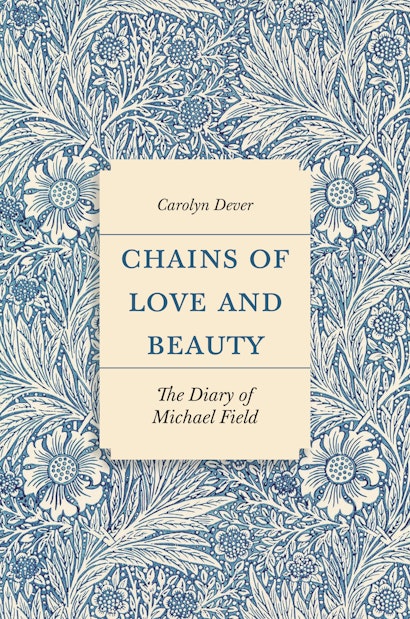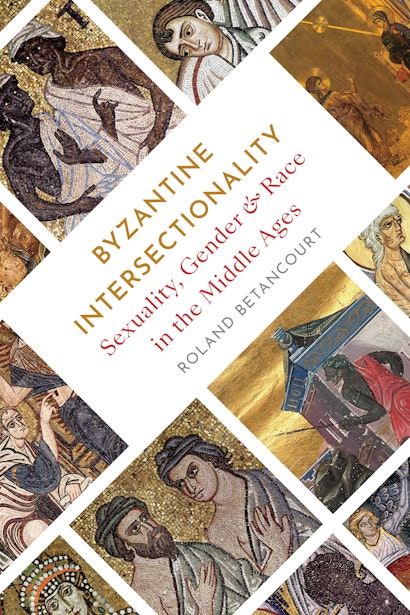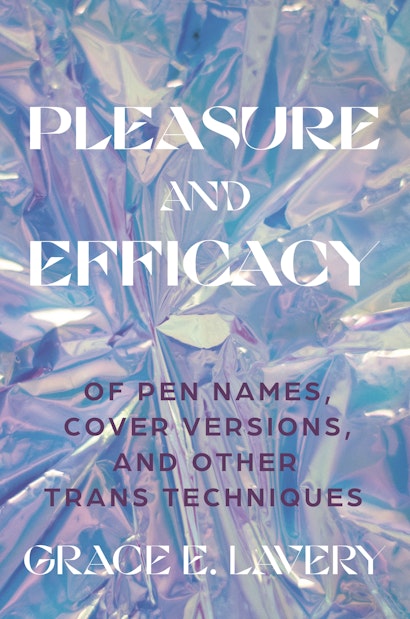Each June, communities worldwide rejoice in the plurality of gender and sexuality, honor the efforts of queer activists and thinkers, and renew commitments to the pursuit of collective freedom. Foundational to today’s celebration of LGBT+ pride is scholarship that unearths queer experiences, expressions, and traditions from across the stretch of human history. In commemoration of Pride Month, we asked three of our authors the following question: What possibilities do queer histories open for charting a future toward liberation? Their responses brought together insights from research spanning regions and centuries to illuminate how producing rich histories of queer life may be generative for the struggle toward empowerment, dignity, and joy for all.
Carolyn Dever | Chains of Love and Beauty: The Diary of Michael Field
What is more central to the constitution of a minoritized community than recognition? Than the capacity of its prospective members to identify one another, and so to find possible common cause not only socially but politically? For the development of affective bonds of safety, care, love, joy?
Legislators in England during the final years of the Victorian period weaponized this insight against men found to be “committing acts of gross indecency with male persons.” What comprised “gross indecency”? Strangely, on this point the legislation—the Labouchere Amendment of the Criminal Law Amendment Act (1885)—was silent. Sex acts such as sodomy (including anal sex, or “buggery”) between men had been criminalized for centuries in England. What problem was this new legislation designed to address? Remarkably, it might be seen to criminalize men for seeming gay. In cases where the act of sodomy was unprovable, the “gross indecency” amendment now made criminal those actions, behaviors, or ways of being that might signal—signal!—some connection to male homosexuality.
“The lessons of queer history, however, teach us the lasting power of discernment, sustaining glimpses of one another, and thus ourselves…”
The Labouchere Amendment quickly gained the nickname the “Blackmailer’s Charter”; what would possibly come of this, other than making some men vulnerable to blackmail? It was silent on the question of female same-sex activity (though not on female heterosexual activity: the larger Act raised the age of consent for girls from thirteen to sixteen). Among the men who were prosecuted and convicted under the “gross indecency” clause were Oscar Wilde and Alan Turing. Practically speaking, the gross indecency law erected a new closet for the isolation of queer men; Wilde’s trials and conviction in 1895 made its capacity for degradation and lethal danger vividly clear. For “Sapphic” women, too, questions of identification and community formation were painfully complex. What were the possibilities—and limitations—of alliance, within couples, between couples, and even across genders?
From 1888–1914, the poets Katharine Harris Bradley and Edith Emma Cooper shared the pages of a diary, titled Works and Days, just as they shared a bed, a home, and a life. Together, Bradley and Cooper published poetry and plays as a male author, “Michael Field,” and they were also aunt and niece, connected through Bradley’s sister, who was Cooper’s mother. Secrets, and their isolating powers, form the bedrock of Works and Days. By circumstance, Michael Field became expert at prising the secrets of others, finding in the process small sparks of sustenance in recognition. Writing in her diary in 1902, for example, Cooper describes an encounter with a couple on a train: “We travel with two women—hermits in a pair, Nietzsche would call them—‘fellows’ we call them. The lover is an intense featured woman […]. The beloved a silly little thing of about two and twenty with whitish blue eyes, and frolicsome smile. They look at each other from the center of their eyes—and I know they are lovers.”
The lovers opposite are a mirror for Michael Field, reflecting the sustenance they find in other same-sex bonds. In 1894, for example, they wonder at the joyous intimacy of their new friends, Charles Ricketts and Charles Shannon. Again, it is Cooper who writes: “Ricketts told us in the garden he wants to get a carbuncle carved into a heart that he may give it to Shannon. […] These two men live and work together and find rest and joy in each other’s love just as we do—two men whose life is complete harmony and two women.” The Labouchere Amendment resulted in the prosecution, persecution, imprisonment, and death of Michael Field’s friend Oscar Wilde. It aimed to degrade as gross and indecent the wants of men—and women—to “live and work together and find rest and joy in each other’s love.” The lessons of queer history, however, teach us the lasting power of discernment, sustaining glimpses of one another, and thus ourselves, in the wild, on the train, in the garden, and in the poetry of those who have gone before.
Roland Betancourt | Byzantine Intersectionality: Sexuality, Gender, and Race in the Middle Ages
One of the most powerful and pressing possibilities offered by queer history is to shatter the sense of novelty that is so often assumed about these issues today. Queer history demonstrates that questions about gender and sexuality are not new, and that our archives have always provided us with ample evidence for the existence of queerness and gender variance across time—evidence that many have chosen to willfully overlook or suppress. While people may use different methods, terms, or frameworks for expressing these ideas, our modern conceptualizations of queerness build upon centuries of conversations.
“The history of gender variance is particularly rich throughout the entirety of the ancient and medieval world on a global scale.”
As a historian that works on the Middle Ages (particularly, the Byzantine Empire), I am always surprised by the depth, nuance, and complexity that our sources evidence about questions regarding gender variance and sexuality. These histories are not always emancipatory or utopian—sometimes they are very painful—yet they speak to the endurance, continuation, and reformulation of communities across time. Other times, these stories are front and center, celebratory and filled with praise, even within the text of Early Christian and medieval commentators, a reality that many are often shocked to learn. Ultimately, the evidence is never what modern assumptions have presumed it to be. I would argue that the biggest impediment to understanding the past is approaching it with the idea that it presents a monotone heterosexual and cisgender history. Nothing could be further from the truth. Even the most hateful of texts speak powerfully to the ways in which humans have recognized the instability of alleged binaries, been concerned about the fluidities of gender and sexuality, and wondered how these questions relate to bigger ideas about the definition of the human being or their relationship with a divine or natural world.
As a historian that is interested in excavating the premodern lives of queer and trans people, I strongly believe that charting the future toward queer liberation means reevaluating our entire history with the unique sensibilities that queer scholars and students offer our archives. The history of gender variance is particularly rich throughout the entirety of the ancient and medieval world on a global scale. It is critical that we recognize and understand these histories to not only demonstrate that these experiences have always been a part of our world, but also to show how the past has resisted, defied, or found queer ways of thriving, even under the most oppressive of regimes. The role of the historian is not to parrot the past, but to use it to clarify our present. Queer liberation has always begun with recognizing that we have a past and working together toward a better future.
Grace Elisabeth Lavery | Pleasure and Efficacy: Of Pen Names, Cover Versions, and Other Trans Techniques
We could distinguish between histories of queer people (on the one hand) and queer relations to the past and to the future (on the other). The former, of course, remains important and necessary, especially since one of the most persistent ruses of patriarchal social reproduction is to make the present appear as a unique sort of aberration, a quirk in a history throughout which people, generally, made the choice to settle into heterosexual, reproductive families. I’m often drawn to the outliers of that narrative: queers like Oscar Wilde who radically rejected that bargain and were punished or (in his case) murdered for having done so. But history does not consist merely of straight people and outliers, and while modern forms of homosexual practice identity and gender transition are, by definition, novelties, the notion that the present is an especially queer time is always suspicious, whether marshalled by Ron DeSantis or by Kathleen Stock. The goal of such practice would be to understand the world around us better, and not necessarily to liberate it (except perhaps in the oblique sense that forewarned is forearmed).
“Does being in love, or having a crush, or having an overwhelming need to change one’s body amount to freedom? Are these experiences not at least as much experiences of blissful unfreedom?”
The second kind of “queer history” is more complicated. Queer theory has long taught us to be wary of assuming that queer history, or even queer life more broadly, is either more liberated or more liberatory than our straight counterparts. In No Future, Lee Edelman notoriously argued that queerness was, definitively, that which resists conscription into normative future-oriented narratives; Heather Love has defended the value of melancholic attachment as a function of queer lives; José Esteban Muñoz theorized the utopian dimension of queerness as its refusal to specify or particularize its unbounded desire. We could further note—as has been a thread in the thinking of Lauren Berlant, David Eng, Jack Halberstam, Jasbir Puar, and others—that gay liberalism has often served as a fig leaf for the neoliberal occupation of power. This story is so common as to be practically universal, whether in the form of colonial civil rights discourse or of pinkwashing, the capture of left-wing and center-left political parties by neoliberal ideologues that celebrate “gender identity” and “sexual orientation” as units of individual personhood but that work to remove protections for queer and trans communities by flogging off healthcare infrastructure and dismantling welfare protections.
Desire is very powerful—in certain respects more powerful than capital. For this reason, the workings of desire can often feel like liberation from capital and, indeed, can sometimes create zones of freedom, operating with some relative autonomy from biopolitical governance. This fact may not, in itself, point towards a broader sense of liberation: does being in love, or having a crush, or having an overwhelming need to change one’s body amount to freedom? Are these experiences not at least as much experiences of blissful unfreedom? Notably, too, they can exist without history of any kind: nobody needs a book to fall in love, though of course it can help! (That John Waters line about not fucking anyone who doesn’t read has always annoyed me. Don’t vote for someone who doesn’t read; fuck whomever you want to.) The work, as ever, is to figure out how to dilate and extend these zones of freedom from the moments where we encounter them, which could be anywhere—an old book, an unexpected frottage, a Lana Del Rey B-side. The dream would be engulfing the entire world—taking it all.
Carolyn Dever is professor of English and creative writing at Dartmouth College. Her books include Skeptical Feminism and Death and the Mother from Dickens to Freud. Twitter @carolyndever
Roland Betancourt is professor of art history at the University of California, Irvine. He is the author of Performing the Gospels in Byzantium and Sight, Touch, and Imagination in Byzantium.
Grace E. Lavery is a writer and academic who lives in New York. Her book Quaint, Exquisite: Victorian Aesthetics and the Idea of Japan (Princeton) won the NAVSA Best Book of the Year prize from the North American Victorian Studies Association. A noted scholar and prominent trans activist, she is the author of the transition memoir Please Miss.



